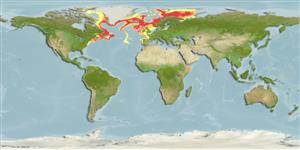Common names from other countries
Environment: milieu / climate zone / depth range / distribution range
Sinh thái học
Biển gần đáy; Ở đại duơng, biển (Ref. 51243); Mức độ sâu 50 - 2000 m (Ref. 4705). Temperate; 79°N - 36°N, 77°W - 55°E
Northwestern Atlantic: southwestern Greenland and Labrador in Canada to Virginia in USA (Ref. 7251); Northeastern Atlantic: Bay of Biscay to Spitsbergen, Barents Sea, Iceland and eastern Greenland.
Length at first maturity / Bộ gần gũi / Khối lượng (Trọng lượng) / Age
Maturity: Lm 122.0, range 135 - ? cm
Max length : 470 cm TL con đực/không giới tính; (Ref. 7251); 300.0 cm TL (female); Khối lượng cực đại được công bố: 320.0 kg (Ref. 7251); Tuổi cực đại được báo cáo: 50 các năm (Ref. 173)
Các tia vây lưng cứng (tổng cộng): 0; Các vây lưng mềm (tổng cộng): 98-110; Tia cứng vây hậu môn 0; Tia mềm vây hậu môn: 73 - 85. Uniformly dark brown or black; young marbled or spotted with paler marks (Ref. 4705).
Adults are benthic but occasionally pelagic (Ref. 4705). Feed mainly on other fishes (cod, haddock, pogge, sand-eels, herring, capelin), but also takes cephalopods, large crustaceans and other bottom-living animals. Batch spawner (Ref. 51846). Growth rate varies according to density, competition and availability of food. Slow growth rate and late onset of sexual maturity, halibut populations can be seriously affected by overfishing (Ref. 35388). Utilized fresh, dried or salted, smoked and frozen; can be steamed, fried, broiled, boiled, microwaved and baked (Ref. 9988). Also Ref. 58426.
Males reach sexual maturity at 7-8 years and females at 10-11 years. Spawning happens from December to April, near the bottom (300 to 700 m), at temperatures between 5 and 7°. Egg size 3.0-3.8, larval size at hatching 6.5 mm (Ref. 4705).
Vinnikov, K.A., R.C. Thomson and T.A. Munroe, 2018. Revised classification of the righteye flounders (Teleostei: Pleuronectidae) based on multilocus phylogeny with complete taxon sampling. Molecular phylogenetics and evolution, 125:147-162. (Ref. 122998)
IUCN Red List Status (Ref. 130435)
CITES (Ref. 128078)
Not Evaluated
Threat to humans
Harmless
Human uses
Can't connect to MySQL database (fbapp). Errorcode: Too many connections
